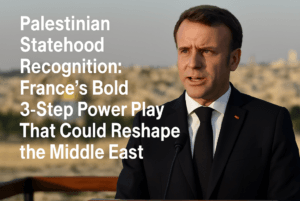Palestinian Statehood Recognition: France’s Bold 3-Step Power Play That Could Reshape the Middle East
President Macron’s announcement that France could recognize a Palestinian state by June 2025—contingent on reciprocal Middle Eastern recognition of Israel—marks a strategic recalibration of Western diplomacy. Breaking from decades of prioritizing bilateral negotiations, France aims to leverage multilateral cooperation, including a proposed conference co-chaired with Saudi Arabia, to revive stalled peace efforts.
This move pressures Israel’s government, which rejects unilateral recognition, while offering Arab states political cover to normalize ties with Israel. The plan aligns with U.S.-backed Saudi-Israeli normalization talks but risks inflaming tensions with Israel’s far-right coalition. Critics argue recognition alone cannot resolve core disputes like borders or settlements, emphasizing the need for concrete steps toward sovereignty.
Macron’s gambit underscores Europe’s growing impatience with the status quo, positioning France as a potential catalyst for reimagining a two-state solution. Success hinges on balancing Arab states’ strategic interests, U.S. support, and overcoming entrenched regional divisions. The June deadline now tests global resolve to transform symbolic gestures into lasting peace.

Palestinian Statehood Recognition: France’s Bold 3-Step Power Play That Could Reshape the Middle East
In a striking diplomatic pivot, French President Emmanuel Macron announced this week that France is prepared to formally recognize Palestinian statehood as early as June 2025, contingent on reciprocal moves by Middle Eastern nations to acknowledge Israel. The declaration, made during a televised interview, signals a potential watershed moment in Europe’s approach to the decades-old Israeli-Palestinian conflict and underscores shifting geopolitical dynamics in the region.
The Context: A Stalled Peace Process
For decades, the “two-state solution” has been the cornerstone of international peace efforts, yet progress has remained elusive. While 139 United Nations member states recognize Palestine as a sovereign state, major Western powers—including France, the U.S., Germany, and the U.K.—have withheld recognition, often citing the need for a negotiated settlement between Israel and Palestine. Macron’s statement breaks from this tradition, positioning France as a potential catalyst for renewed diplomacy.
The timing is significant. Macron’s remarks follow his recent visit to Egypt, where he emphasized humanitarian aid for Gaza amid ongoing fallout from the October 2023 Hamas-Israel war. The conflict, which reignited global debate over Palestinian statehood, has intensified pressure on Western governments to reassess their positions.
Macron’s Vision: Reciprocal Recognition
Central to Macron’s proposal is the idea of mutual recognition: France would recognize Palestine if Middle Eastern states—notably Saudi Arabia, Iran, or others that currently deny Israel’s legitimacy—extend reciprocal recognition to Israel. “This isn’t about symbolic gestures,” Macron stressed. “It’s about creating a balanced framework where both sides commit to coexistence.”
The French president hinted at a broader diplomatic initiative, suggesting a June 2025 conference co-chaired with Saudi Arabia to formalize these steps. Saudi involvement is critical; the kingdom has historically conditioned its recognition of Israel on progress toward Palestinian statehood, though recent backchannel talks suggest shifting priorities, including security partnerships with the U.S.
Regional and Global Implications
- Pressure on Western Allies: France’s move could nudge other EU holdouts like Germany and Italy toward recognition, particularly if framed as part of a coordinated strategy. Ireland, Spain, and Norway have already signaled support for Palestinian statehood, reflecting growing European impatience with the status quo.
- Saudi-Israel Normalization: Macron’s nod to Saudi leadership in the proposed conference aligns with U.S.-brokered efforts to normalize Saudi-Israeli relations—a process stalled by the Gaza war. Recognition of Palestine might offer Riyadh political cover to advance ties with Israel while addressing domestic and regional concerns.
- A Challenge to Netanyahu’s Government: Israel’s far-right coalition has vehemently opposed Palestinian statehood, advocating instead for annexation of parts of the West Bank. Macron’s plan could isolate Israel diplomatically, intensifying global scrutiny of its policies.
Skepticism and Challenges
While Palestinian officials welcomed Macron’s remarks as “a step toward justice,” critics caution that recognition alone cannot resolve core issues: contested borders, Israeli settlements, security guarantees, and the right of return for refugees. “Statehood without sovereignty is an empty promise,” said Leila Farsakh, a Palestinian scholar. “France must couple recognition with tangible pressure to halt settlement expansion.”
Meanwhile, Israel’s Foreign Ministry dismissed the proposal as “detached from reality,” asserting that unilateral recognition rewards terrorism. In France, Macron faces domestic pushback from conservatives who argue the move undermines Israel’s security.
The Road Ahead
Macron’s gambit reflects a broader recalibration of European diplomacy, blending humanitarian concerns with realpolitik. By linking Palestinian recognition to Saudi-Israeli normalization, he aims to revive a multilateral approach to peace—one that balances Arab states’ strategic interests with Palestinian aspirations.
Yet the success of this strategy hinges on fragile alliances. Saudi Arabia’s participation remains uncertain, and U.S. support is unclear. Moreover, with Israel’s government unlikely to concede to Macron’s terms, the June conference risks becoming another missed opportunity.
Conclusion
France’s potential recognition of Palestine marks a bold departure from decades of Western caution. While symbolic, it underscores a growing consensus that the two-state solution cannot wait indefinitely for bilateral negotiations. Whether Macron’s vision translates into meaningful progress—or further polarization—will depend on his ability to rally skeptical allies and navigate the volatile terrain of Middle Eastern politics.
As the June deadline approaches, all eyes will be on Riyadh, Paris, and the delicate dance between recognition and reciprocity.
You must be logged in to post a comment.